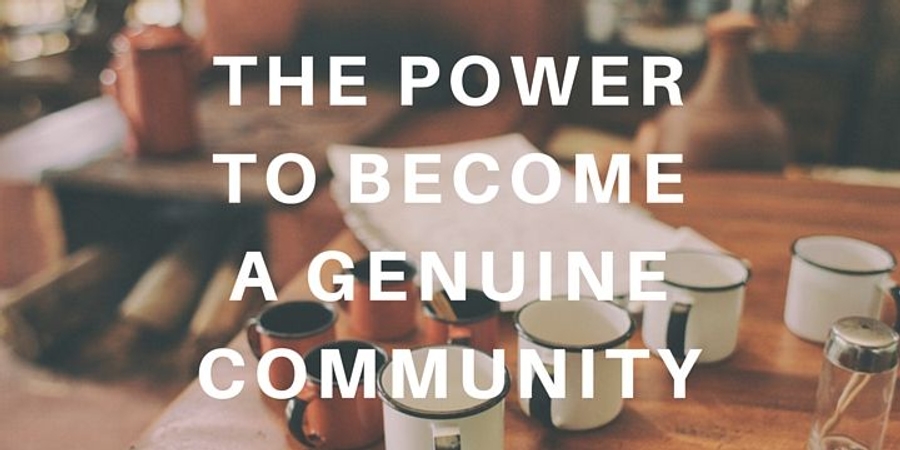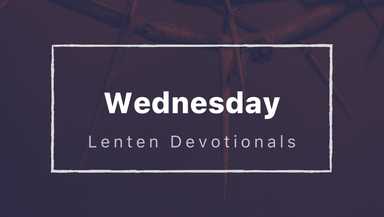
The Church: God’s “Alternate” Community
This series of blogs discusses the topic of “community”: God’s promise, and the elements, of a genuine, “alternate” community founded upon His character, mission, and grace. The foundations of this community rest on the history of God’s faithfulness to His chosen people—and are assured through Jesus’ finished work on the cross. Luke 6:12-16 teaches us that you don’t become a disciple because you “obeyed” well. Your obedient, moral life is not what qualifies you into fellowship with God. In fact, the reason why many Christians are not as winsome as they could be is because we often forget that we become disciples because Jesus called us first—not because we earned a place in His service. Luke 6:17-34 teaches us about the components of God’s “alternate” community. God’s people are characterized by the values held by the people on the “inside”, and also by the relationships they maintain with people who do not follow Jesus. What Jesus taught was this: that you should be so winsome and demonstrative of the love of Jesus, as a community, in your embrace of everyone in the city (believers and nonbelievers alike), that people will be attracted to Jesus as a result. People, because they belong with you—will come to believe in Him. Now, that sounds like a tall order. After all, who can do this faithfully? Jesus gives us the power to do all this as a community in Luke 6:35-36.
The Power To Become A Genuine Community
The law is not the central thing to the Christian faith. What is the spiritual purpose of the law? Exodus 19:4: “I {God} carried you…Now, listen to me.” God is the “eagle” that swoops down and rescues you. This is central to faith. What did the people contribute to this? They were rescued. They did absolutely nothing. God had already saved you. Now, if you listen to Him, you will experience true life, a new life! Jesus had already called you; when you became a Christian, that’s what happened. Now, we listen to His calling continuously. First, our status changed; now, our character changes. You are changed personally, but you are also brought into a community, and will be changed corporately. This is for the quality of the sonship, the quality of the redeemed citizen of heaven. You may, or may not, have a good life in a worldly sense, but if you obey the Lord, you will live a rich Christian life. You will know God intimately because you are already saved; then, why would you want to continuously obey? The answer: God says that You will be His treasure. He made us His treasured possession. To treasure someone is to love them so dearly, that it pleases you to make them happy. You are placing your happiness and joy into that person’s happiness and joy. God has listened to the deepest needs of your heart, and He gave them to you in Jesus, His Son. Now, if you obey Him, you get to see His heart; because you are in, you get to see what gets Him. The treasure is the private wealth of the king, since the king owned everything. Every king owned everything in his kingdom, but also had a private treasure that he went to the grave with. God says that those who embrace His laws will be His treasure, His very private wealth. Where does it say in the Bible that you are God’s treasure? It is in the last two verses (Luke 6:35-36): You will be sons of the most high, for He is kind and gracious. In order to come to grips with this truth, however, you have to have a revolution in your heart, soul, and mind with regards to your view of sin and evil. In this entire passage, Jesus seemingly refers to “sinners” as those on the “outside”—those we dislike, those we judge—it’s usually because, deep inside, there is a longing to feel morally or outwardly superior than others. Scripture says that this is the true reason why there is such a competitive drive within us to be approved in some way—through our looks, our grades, our awards, our relationships, the number of connections we have, the amount of money we make, our pedigrees, the number of children we have (and how well they are behaved), etc. It’s a spiritual desire to still want to earn God’s approval—our hearts always want us to believe that God’s grace is less significant—that we can still earn His approval on our own. We desire to be called “sons” of the Most High God, to be His treasure. However, we are a lot more flawed, failed, unattractive (superficially or in character), insecure, approval-seeking, and morally inconsistent than we think we are. Certainly no less than those we judge. You may think you’re “religious”, or more “moral”, but why are you more moral? To even think that it is because you’ve placed your moral accomplishment as a measure for why you are more acceptable to God—this is why we always compare ourselves with others. We have to go deeper into our own hearts if we do not see that (or if we disagree). We are being our own savior in some way if we do not see that we are wicked, just like those we judge. In different ways, we try to be our own “saviors”. But, think about this: some of the worst murderers were religious people. Some of them were atheists. Until we realize that we are no different qualitatively than those we once judged, we cannot come to the Lord. However, once we come to this conclusion, we can also realize that God has provided a way to make us “sons” despite our evil. How? At the heart of the Gospel of Jesus Christ is the truth that you are evil, yet you are His child. No other religion deals with sin this way. Common sense says you are either evil or you are His child. But, Jesus gave up His own Sonship on the cross (He was utterly forsaken by the Father) in order for an amazing reversal to take place. Whenever Jesus addressed God, He addressed Him as His Father. Look through the Gospel accounts in the Bible; Jesus always calls God His “Father”, except once. On the cross, Jesus cried out, “My God, my God, why have You forsaken me?” Why? He did this because, on the cross, Jesus ceased being the Son of the Most High. On the cross, He was excluded. On the cross, His status was removed. Jesus was cast out on the cross, so that we could be brought in. Jesus was disowned by the Father, so that we could become sons of the Most high. Christianity, as a result, says we are both wicked, yet at the same time, we can be His children. This truth gives us power to become truly accepting of all types of people. Fundamentalists are intolerant, depending on what your “fundamental” is. If your “fundamental” is: “If you are good, then you go to heaven,” then you will be completely intolerant, competitive, and arrogant. However, if your “fundamental” is: “We are all sinners; Jesus died for them as for me, and so it’s possible for anyone else to also experience the same grace,” then it would be internally inconsistent to remain intolerant of others. You would, perhaps, for the first time, genuinely embrace other types of people—both the “religious” and “irreligious”. In essence, the heart of a true community in Christ is based on a personally-experienced grace that bears a corporate conscience. This is what the church is about. There is a lack of holiness in people in general; it is a reminder for us of the need for the Gospel in and out of the church, and what the abiding Spirit actively does when the Gospel has transformed us. The church is a band of natural enemies who now love one another in Jesus’ name, and for His sake, and by His brokenness. When you come to this grace, and then see others who have also come to this grace, you become a people in a church that will do some amazing things in the love of Christ, as Christ gave His own life for His broken people.
AN INVITATION TO VISIT OUR COMMUNITY
Come visit Metro Presbyterian Church to see how the Lord has shaped our community in the Gospel—we desire to be a community that preserves, embodies, demonstrates, and convinces one another of values that are shaped, and treasured, by the Gospel. It begins with our Sunday Worship Service, and in the continued growth of our Community Groups—all in the context of shaping our Gospel-character. And there’s so much more, but it doesn’t happen without your deep consideration and participation.



